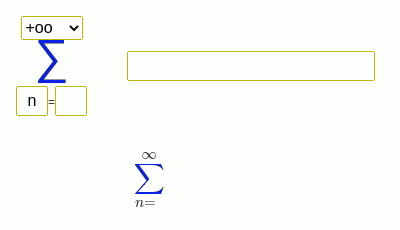Sum of series cos*pi*n/((n^3+1)^2)
The solution
You have entered
[src]
oo ____ \ ` \ cos(pi)*n \ --------- ) 2 / / 3 \ / \n + 1/ /___, i = 0
$$\sum_{i=0}^{\infty} \frac{n \cos{\left(\pi \right)}}{\left(n^{3} + 1\right)^{2}}$$
Sum((cos(pi)*n)/(n^3 + 1)^2, (i, 0, oo))
The radius of convergence of the power series
Given number:
$$\frac{n \cos{\left(\pi \right)}}{\left(n^{3} + 1\right)^{2}}$$
It is a series of species
$$a_{i} \left(c x - x_{0}\right)^{d i}$$
- power series.
The radius of convergence of a power series can be calculated by the formula:
$$R^{d} = \frac{x_{0} + \lim_{i \to \infty} \left|{\frac{a_{i}}{a_{i + 1}}}\right|}{c}$$
In this case
$$a_{i} = - \frac{n}{\left(n^{3} + 1\right)^{2}}$$
and
$$x_{0} = 0$$
,
$$d = 0$$
,
$$c = 1$$
then
$$1 = \lim_{i \to \infty} 1$$
Let's take the limit
we find
$$\frac{n \cos{\left(\pi \right)}}{\left(n^{3} + 1\right)^{2}}$$
It is a series of species
$$a_{i} \left(c x - x_{0}\right)^{d i}$$
- power series.
The radius of convergence of a power series can be calculated by the formula:
$$R^{d} = \frac{x_{0} + \lim_{i \to \infty} \left|{\frac{a_{i}}{a_{i + 1}}}\right|}{c}$$
In this case
$$a_{i} = - \frac{n}{\left(n^{3} + 1\right)^{2}}$$
and
$$x_{0} = 0$$
,
$$d = 0$$
,
$$c = 1$$
then
$$1 = \lim_{i \to \infty} 1$$
Let's take the limit
we find
True
False
The answer
[src]
-oo*n
---------
2
/ 3\
\1 + n /
$$- \frac{\infty n}{\left(n^{3} + 1\right)^{2}}$$
-oo*n/(1 + n^3)^2

Examples of finding the sum of a series
- The Sum of the Power Series
x^n/n
(x-1)^n
- Factorial
1/2^(n!)
n^2/n!
x^n/n!
k!/(n!*(n+k)!)
- Flint Hills Series
csc(n)^2/n^3
- Basel problem
1/n^2
1/n^4
1/n^6
- Harmonic series
1/n
- Grandi's series
(-1)^n
- Alternating series
(-1)^(n + 1)/n
(n + 2)*(-1)^(n - 1)
(3*n - 1)/(-5)^n
(-1)^(n - 1)*n/(6*n - 5)
- Newton–Mercator series
(-1)^(n + 1)/n*x^n
- Exam the series for convergence
(3*n - 1)/(-5)^n

 9/(9n^2+21n-8)
9/(9n^2+21n-8)
 (n^3+n+5)/(n+6)
(n^3+n+5)/(n+6)
 1/((5n-4)(5n+1))
1/((5n-4)(5n+1))